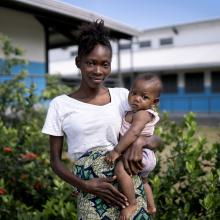Quality Essential Health Services and Systems Support Project (QEHSSSP)

The Quality Essential Health Services and Systems Support Project (QEHSSSP) enhances health care delivery at 179 peripheral health units (PHUs) across five rural districts, ensuring that patients receive vital services regardless of their location.
Our Impact
PIH-SL is supporting the Ministry of Health in improving the quality of essential health services across five districts is Sierra Leone care by replicating PIH’s “5S” model.
-
1,843clinicians
participated in hands-on trainings in 2025
-
10,026patients
visited Jojoima Community Health Center in Kailahun District in 2025
-
24hour
patient services are available at Jojoima Community Health Center
Essential Health Services
PIH-SL is supporting the Ministry of Health (MOH) in improving the quality of essential health service delivery in five districts outside of Kono, including Kailahun, Bonthe, Falaba, Tonkolili, and Western Area Rural. By leveraging the hub-and-spoke service delivery model, that has proven its impact in Kono District, PIH-SL is taking learnings and best practices to 179 health facilities across Sierra Leone. The key is a continuous web of care that flows back and forth, between hub and spoke facilities, as patients’ needs are assessed, triaged, and met from community, to clinic, to hospital. The implementation of QEHSSSP, funded by the World Bank, aims to increase the utilization of facility-based health services and improve maternal and child health care by supporting peripheral health units in rural districts so that patients, regardless of where they live, will receive the services they need—and deserve. PIH-SL is directly implementing the project in Kailahun District and provides technical assistance to the MOH District Health Management Teams, which are leading the implementation in the remaining four accompaniment districts. The project focuses on improving maternal and child health outcomes for approximately 2 million people by increasing facility-based deliveries and access to nutrition services.
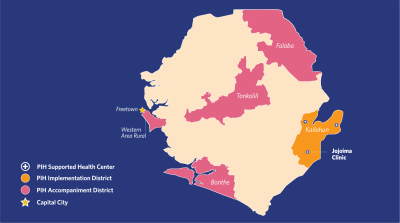
Jojoima Health Center
Jojoima Community Health Center (CHC) in Kailahun district has seen a great transformation across the “five S” - staff, stuff, space, systems, and social support. Staff have been hired and trained, health commodities including drugs, medical equipment, laboratory equipment, and consumables have been procured, patient services are available 24 hours a day, and there is access to running water through the installation of 50,000-liter water tanks. Equipping the facility with staff, supplying stuff, and enhancing the space has significantly improved health care delivery. In 2025, Jojoima received 10,026 patients, a 33% increase from last year, with 199 patients undergoing c-sections.
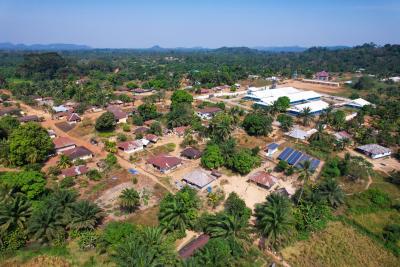
Jojoima Community Health Center is located in rural Kailahun District.
AbuBakarr Tappiah Sesay / PIH
Surgery
PIH-SL is establishing Jojoima CHC as a modern, well-equipped facility specializing in maternal and newborn care. Is is also home to pediatric care and other essential health services. The team celebrated the first surgeries performed in this facility in November 2023, where six children underwent hernia repair surgeries, completely free of charge, done by a team of highly skilled professionals. Overall, 201 Hernia Surgeries were conducted in 2024. The first C-section at Jojoima was performed in March 2024. In 2025, a total of 199 C-sections were conducted.
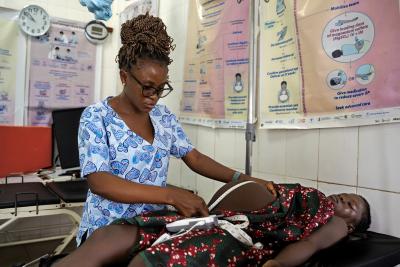
Midwife Aminata examines expectant mother Hawa in the labor wart at Jojoima Community Health Center in Kailahun district.
AbuBakarr Tappiah Sesay / PIH
Blood Bank
Supporting blood transfusion services at Jojoima CHC and Kailahun Government Hospital marked a significant milestone. The first donation was given in March 2024, followed by the first blood transfusion in April 2024. Through blood drive sessions, a total of 641 units of blood have been successfully collected across Kailahun district in 2025, greatly enhancing emergency care and maternal health outcomes in the district.
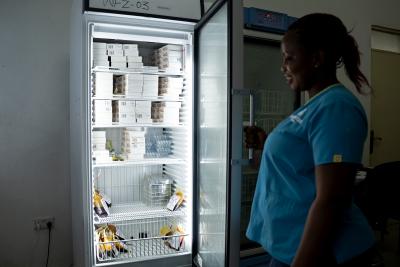
The blood bank at Jojoima Community Health Center stores blood bags and other essentials in refrigerators.
AbuBakarr Tappiah Sesay / PIH
Clinical Education
Over 1,800 staff participated in trainings across all five QEHSSSP supported districts in 2025. The training topics included Integrated Management of Newborn & Childhood Illness, Integrated Obstetric Care Guidelines, short-term family planning, long-term family planning, and monitoring and evaluation. This is essential to equipping individuals with the skills to respond effectively to life-threatening situations during childbirth. The training not only enhances the capacity of health care facilities but also fosters a culture of preparedness and confidence among health workers, ultimately leading to improved health outcomes for mothers and infants.
